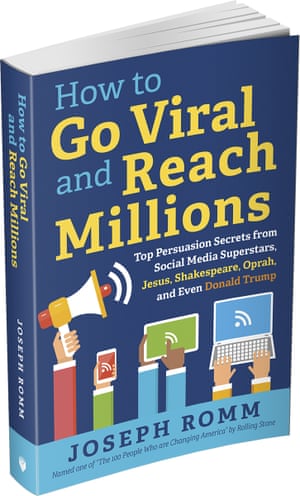
Scientists like me – and really, everyone – can learn from President Donald Trump’s mastery of viral messaging.
True, he has turned the United States into a pariah nation, one reviled for ripping immigrant children from their parents and from withdrawing from our only real chance at stabilizing the climate, the Paris Accord.
But Trump’s success at creating and maintaining a political base is not because of his incoherent policies. It is solely because he is able to communicate with people in ways that that evoke emotion, go viral, and make people think he understands them.
The way super-communicators like Jesus, Shakespeare, Oprah, or even Trump work their magic was unpacked by Dr. Joe Romm in a must-read book, How To Go Viral and Reach Millions.
The cover of ‘How to Go Viral and Reach Millions’
The job for scientists, for all of us, is to learn the techniques that make our messages clicky and sticky, but use the techniques in a way that keeps the science true and the facts straight. Be a Jedi, not a Sith Lord.
Yet it’s more than just that. Many of us – scientists included – downplay the importance of catchy writing, memorable phrases, and captivating metaphors. Using purposefully compelling language is somehow ‘dirty.’ I am a scientist for crying out loud. Can’t I just stick to facts, show my graphs, and let the data speak?
No, you can’t; not if you want anyone to hear you or listen to you.
And if no one is listening to you, why are you here?
Let me be clear to my colleagues, all so-called pointed-headed, ivory-tower intellectuals who think they have something important to say. Listen up. Are you listening?
There is nothing special about you and your message.
Audiences are fire-hosed with information from all sides. We have very little time to really dig deeply into issues. Communicators are competing with many other voices, and most more interesting than you. So, if you are not going to learn techniques to communicate quickly and compellingly, you might as well just stay home.
So how does Dr. Romm’s book teach effective communication? I won’t spoil it too much – you need to read the book. But I will tell you that he has five basic rules that he leads with. I will also tell you that he teaches everything from word choice to how to recast your scientific stories in ways that connect with people emotionally. He tells the importance of long-successful tools such as repetition, use of irony, metaphor, and foreshadowing.
But perhaps the most important chapter is the one devoted headlines. How the first few words a reader sees or hears are all-important in determining whether they will devote any mental energy to your message. Whether they will click on your headline, read any part of your article, keep the channel tuned to your station, or just tune out and turn off.
Throughout the book, Dr. Romm weaves in evolutionary biology, art, and history to reinforce his message. He discusses how the human brain evolved to be able to process huge amounts of data. The processing amounts to quickly assessing whether a situation warrants our attention; think of these as “mental shortcuts” that we use, subconsciously, to determine whether and how we digest a message. He shows how the world’s greatest artists and communicators have used the very same strategies throughout history to go viral, to get their message to spread and endure.
In a nutshell, Dr. Romm teaches techniques to become a force of good in this world using time-tested techniques. We can be Luke Skywalker, not Darth Vader.
I asked Dr. Romm why he wrote this book and he told me:
Posted by John Abraham on Wednesday, 27 June, 2018
 |
The Skeptical Science website by Skeptical Science is licensed under a Creative Commons Attribution 3.0 Unported License. |